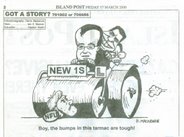Credit crunch
The credit crunch is caused by lax lending policies - 125% mortgages - feeding a property buying boom, where everyone has to stay on the escalator for the game to work. Eventually some of the property buyers could no longer service their mortgages, and the death spiral began.
So just what is Gordon trying to do?
He is offering the banks the ability to sell mortgages to the Government in exchange for Bonds
so that they can continue their lending policies.
The lack of liquidity in the market is caused by the banks fear that they might need cash sometime in the future, and they are reluctant to lend to each other. The measure of this is LIBOR (the London Inter-Bank Offer Rate), which is currently about 1% higher than Base, and is an indicator of the risk adverse nature of the markets at present. Historically it has normally been around 0.25% higher.
So Gordon, using our money remember, is prepared to buy mortgages that the other banks won't touch, with an unknown risk factor, in exchange for guarantees to allow the banks to continue to lend.
Now, don't get me wrong, the principle is right - to encourage liquidity in the markets - but the ability of the Government to manage this process is where my worries lie.
Given the Northern Rock fiasco, where the will-he/won't-he dance of the Chancellor as Gordon pulled his strings indicated a desperate inability to be decisive, and a desire for matters to take their course, before anything was done. As Matthew Parris in the Times noted, Brown has had a reputation for Machiavellian manoeuvring behind the scenes during all his years in Number 11, in reality it was a crippling inability to take decisions.
Having flown in complete anonymity to New York to have a power breakfast with some bankers who didn't have a clue who he was, Gordon Brown doesn't realise that is not the way to solve a crisis and construct a new economic policy.
With banks having made huge profits, and employees on multi-million pound bonuses , the benefits of selling these risks and generating cash out of nothing, have flown to a few very fat and greedy hands. Instead of dealing with this greed, the Chancellor now wants to throw more money at the problem. Our money. To those who have a lower tax rate than their cleaners. And to those - such as the new Chief Executive and Finance Director of Northern Rock - who don't pay tax in the UK.
Thankfully, one Bank has seen the obscenity in this and is going to those who shared the gains - the shareholders - to ask for the money to fund the future cash requirements. This is risky, given that market sentiment is unclear, but it is ultimately the only way that banks will escape from the hole of their own making. Expect to see more banks making rights issues.
The next stage is to tackle the obscene profits being made by the bank employees, and to tie them to the impact of their decisions. I have long advocated higher tax rates for the most wealthy, but in addition I would like to see a more punitive rate for the very highest earners unless they take it in the shares of their company and hold them for (let's say) at least 5 years, hence making them thing about the long-term risk of their wheeling-dealing rather than the £m Xmas bonus.







1 comment:
like the beijing - thing, top right
LS
Post a Comment